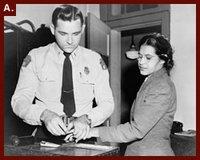 This isn't the usual post here, but I cannot let Rosa Parks' passing go without saying something.
This isn't the usual post here, but I cannot let Rosa Parks' passing go without saying something.My viewpoint is of a white boy growing up in a small town outside of Montgomery. I missed the bus boycott (I was 1 when it happened), but it was still talked about when I was becoming aware of the civil rights movement as I started school in 1960. If that seems young for political memories, take a moment to put civil rights and school integration into the context of small town Alabama of the time. For whites this was an upheaval of the social order. The New York Times obituary describes that social order well:
On Montgomery buses, the first four rows were reserved for whites. The rear was for blacks, who made up more than 75 percent of the bus system's riders. Blacks could sit in the middle rows until those seats were needed by whites. Then the blacks had to move to seats in the rear, stand or, if there was no room, leave the bus. Even getting on the bus presented hurdles: If whites were already sitting in the front, blacks could board to pay the fare but then they had to disembark and re-enter through the rear door.
These mundane injustices were, of course, only the tip of the iceberg of racism that pervaded my hometown and state. My home county was 70% black, but had no blacks registered to vote in 1960. Education was, of course, segregated and anything but equal. All the businesses on the two blocks of "main street" were white owned and none employed blacks, at least not "out front" dealing with customers-- quite a few blacks worked in the back, doing hard chores. And the police and sheriff were friends of mine, but not all that interested in equal justice. And of course the churches were as rigidly segregated as the schools. The Klan was strong in my home county.
So when Rosa Parks didn't get up for a white man to sit, it was a radical action, one that my students today cannot really imagine, let alone understand as white southerners of my generation can. She challenged a social system that was an abomination and a mockery of the words of the Declaration and the Constitution (as amended.) And that act required a courage that surpasses my comprehension.
But that courage ceased to be rare after Rosa Parks' example. In Montgomery at first, with the boycott and then throughout Alabama and the south, African-Americans risked much and sometimes lost their lives in the pursuit of equal rights. The famous are remembered and revered, as they should be. But I also remember the un-famous who integrated the schools in my little town, who registered to vote when their names were noted by white officials and who spoke out when speaking was so terribly lonely. And continued to do so year after slow year of gradual progress. Their courage was at least as great as that of the famous.
What Rosa Parks did for black folks is obvious. From her small act grew a mighty movement. So what did Rosa Parks do for me, a white boy from Alabama, and all my kind? She saved our souls. The social order I grew up with was a mortal sin, damning the souls of all of us who supported and perpetuated and benefited from that evil. Thank God for Rosa Parks and all the brave souls who followed her. My kind may yet have a chance at forgiveness and salvation.
